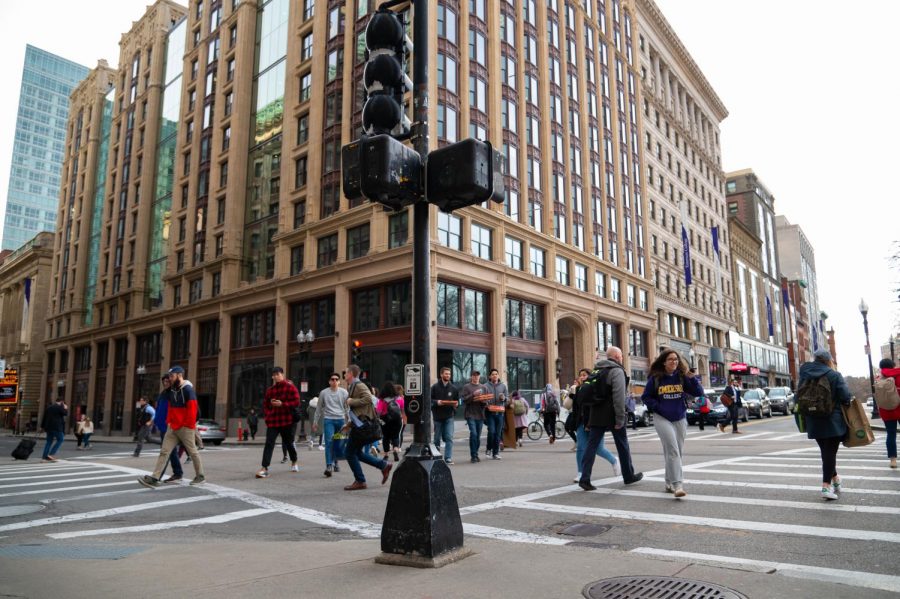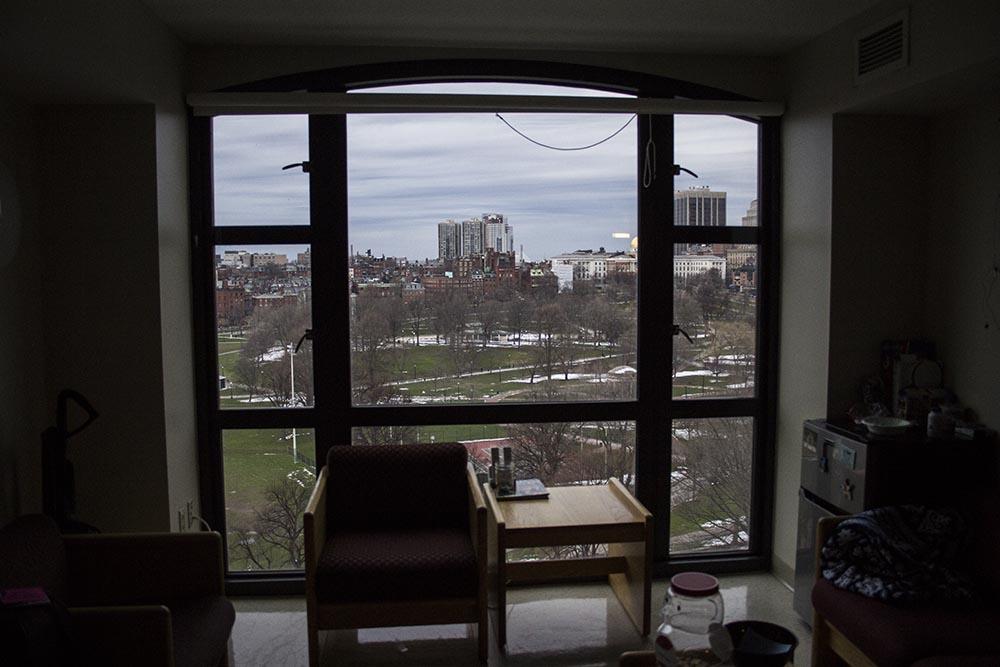In attempts to secure an exemption to escape on-campus housing and its nearly $20,000 annual price tag, some students are taking an unorthodox leap—getting a domestic partnership.
Students at Emerson are mandated to spend their first three years at the college living on-campus—a policy enacted from the fall of 2017 onward—barring six possible exemptions. These include having served in the military, being over the age of 25, or being in a domestic partnership recognized by the state of Massachusetts.
Since April 1, at least four pairs of Emerson students have obtained the unconventional last option, according to data obtained from the City Clerk’s office. All of these students got domestic partnerships at least in part to skirt the on-campus residency requirement, The Beacon has confirmed.
This trend has not gone unnoticed by the college. The Office of Housing and Residential Education has placed a “temporary pause” on the domestic partnership exemption, according to the office’s director, Christie Anglade.
“The temporary pause was implemented to allow time to further examine individual requests and clarify the legitimate parameters of the exemption,” Anglade wrote in an emailed statement to The Beacon.
This suspension has not been publicly announced to the student body, and the domestic partnership exemption is still listed as a viable option in the Housing Portal.
When sophomore Rocco Polanco learned he was among the students who did not win the housing exemption lottery to move off-campus after citing financial hardship, he considered his options and found the domestic partnership exemption to be the most feasible.
“I’m not in the military, I don’t want to have a kid, so I’m going to sign up for a domestic partnership with a suitemate who was also not allowed off campus,” Polanco, a comedic arts major, said in an interview.
In the City of Boston, obtaining a domestic partnership is as simple as filling out a form on the city’s website. Both partners must declare that they share living expenses, assume responsibility for each others’ welfare, and are at least 18 years old. The filing fee and a certified copy of the domestic partnership from the City Clerk costs $62; dissolving it costs $12 and requires another form.
“Maybe we didn’t love each other in the way many domestic partners do, but we were living together, we were sharing living expenses, we were taking care of one another, and we didn’t feel like it was necessarily a lie,” Polanco said.
Domestic partners assume many of the same legal benefits as a married couple, including hospital visitation rights, family healthcare coverage, and shared employment benefits, according to the Massachusetts-based Miller Law Group.
Jonah Kaplan, a senior visual and media arts major, attempted to secure a housing exemption for the upcoming fall semester, when he will attend Emerson Los Angeles.
“The idea of going back to a dorm at 22 when I’m trying to land in LA and find work in my career is ridiculous to me,” said Kaplan, who has not lived on campus since his first year at Emerson.
He planned to move into an apartment with his girlfriend of three years, Cho Yin Rachel Lo, who graduated from Emerson this spring (Lo is a former Beacon staffer). When Kaplan’s first exemption request, to move in with a cousin, was rejected, Kaplan and Lo decided to kill two birds with one stone.
“To us, moving to a new place, that felt important that we were going as a unit,” Kaplan said. “When I saw it on the form, I was like, ‘Oh, hey, there’s that domestic partnership thing again.’ We’ve been calling each other our partners for two years at this point, and so it was a reminder in my brain that it was on the list of things to do, but by no means was it, like, ‘How am I going to find a loophole?’”

Jonah Kaplan and Cho Yin Rachel Lo
The more traditional benefits of a domestic partnership are at the forefront for Kaplan and Lo. Lo is not a U.S. citizen, so the partnership allows her to receive Kaplan’s health insurance benefits, and would allow either of them to make medical decisions for the other should it be necessary, he said.
Yet, when Kaplan applied for a domestic partnership exemption, he was rejected once more, with Chad Myers, Emerson Los Angeles’s director of Housing and Student Life, citing “perceived abuse” of the exemption by “a number of students.”
“You had months to decide how these parameters work,” Kaplan said. “I looked at the rules, and I’m in a legal domestic partnership with a legitimate individual who is my significant other—there’s no abuse there.”
Kaplan, who was eventually released from the requirement after explaining his specific circumstances to Myers, called the suspension of the exemption a “ridiculous precedent.”
“I don’t think it’s saying too much that the reason I’m sure they’re making this requirement so strict is Emerson has lost a lot of money, not having people in dorms being remote,” he said. “I can’t blame them for doing that. I just think that they should respect the rules that they laid out.”
The residency requirement was lengthened from two years to three years in 2017 in part, President M. Lee Pelton said, because former mayor Martin J. Walsh issued a mandate in 2014 asking area colleges to add more on-campus housing capacity. Walsh did so to prevent students from placing a strain on the city’s housing market.
But these changes have been met with student chagrin. A poll from the Emerson College Polling Society conducted in fall 2019 showed that 45.1 percent of students disapproved of updates to the on-campus residency requirement.
The number of residency requirement releases at Emerson shrank after the renovation of the Little Building added 280 new beds to fill. Amid the pandemic, the college loosened the process for students wishing to live off-campus, adding a request specific to the 2020-2021 academic year that asked students to write a personal statement on why they wished to be released from the housing requirement.
Anglade declined to provide The Beacon with the number of students who applied for and were released from the housing contract for the upcoming academic year as compared to last year.
“So many factors have been atypical due to COVID-19 that comparative data would not be a strong indicator of a trend,” Anglade said.
Finances are also a strong incentive for Emerson to keep students on-campus. The college incurred a planned deficit for two years to take on the construction of the Little Building, which also meant losing room and board revenue. Room and board costs amount to about 16 percent of the school’s revenue, according to Emerson’s latest tax forms. On many occasions, Pelton cited the reopening of the Little Building as a large source of revenue and relief to the constrained operating budget.

Students cross the intersection of Boylston St. and Tremont St. in front of the Little Building.
The college is able to accommodate about 70 percent of its undergraduate student body in on-campus housing.
The economic strain of the pandemic made room and board costs even more crucial. Vice President for Administration and Finance Paul Dworkis, in his March update on the college’s finances, pinned the continuing financial success of the college as “highly dependent upon our residency levels.”
Polanco, the sophomore who applied for a domestic partnership with his roommate, said finances played the largest part in his desire to live off campus. He said he takes classes at a community college, works over the summers, and is trying to graduate a semester early, all to cut costs.
“[Off-campus housing] was half the cost of on-campus housing, and that was the last thing that was really kicking my teeth in,” he said.
As of Fall 2021, room and board costs for a double-occupancy room is $19,144 for the academic year. Students live on campus approximately seven months out of the year, meaning they pay approximately $2,735 monthly for room and board.
By comparison, the average rent for a two-bedroom apartment unit in Boston is currently $1,890 a month, according to The Boston Globe, though this number doesn’t include groceries or other board benefits.
Polanco said he was inspired to pursue a domestic partnership after two of his friends took the same route.
“They didn’t have really any issues, they said that Emerson just let them off immediately,” he said. “We didn’t really want to do that because we felt that our argument would be stronger with financial hardships because we had evidence to prove it. We went through financial hardships hoping that they would sympathize with us, but it kind of just feels like they didn’t at all.”
Polanco ended up not going through with the domestic partnership because his potential partner backed out. Though he and his suitemates were “over the moon excited” about an apartment they were planning to rent in Cambridge, he said he’s going to stick out another year on campus. He plans to try to obtain an academic scholarship over the summer from the college.
“If they say no to that, then I’m going to have to transfer and go to a school that I can afford,” he said. “That’s really something that’s upset me.”

An Emerson dorm room.
One rising sophomore media arts production major, who spoke to The Beacon on the condition of anonymity, said he would save $8,000 a year if he moved off campus.
He said he was inspired by upperclassmen friends of his who obtained a domestic partnership to be released from the housing contract ahead of the Fall 2019 semester and explained the process to him.
“I was like, ‘This is such a smart plan, this is foolproof,’” he said. “If you can use the rules to your advantage, why not?”
He is responsible for paying his own room and board costs, which is what drove him to get a domestic partnership with a friend who also wanted to move off campus after he was rejected for a financial hardship exemption.
“I’m 20 years old and I’m in a domestic partnership—that’s something I never thought I would say,” he said. “It’s unbelievable to me that I had to go that far to get off campus.”
He was shocked when the housing office informed him the domestic partnership exemption was paused after he submitted his paperwork. He said he had reached out to them before the May 1 priority deadline to make sure he wouldn’t be refused an exemption if his documentation came in late, and he said they mentioned nothing about a pause on the exemption.
“They only really let you know that they’ve changed their rules once you play the game to get out of the housing situation,” he said.
Now, his other friends are committed to other housing arrangements.
“I entered into this contract and this was the way to get out of it, and now you can’t take that away,” he said. “You really are not in the position to ask me personal questions about my relationship. If it’s legal, if I have the documents, you have to believe that, and you have to trust that. You can’t question the city of Boston.”
If he can’t get released from the housing contract, he said, he will not come back to campus, and will consider transferring schools.
“I cannot have that cognitive dissonance going into my year,” he said. “Last year, the thought of paying that much money was disrupting enough. It was anxiety producing enough. I don’t want to go in being like ‘I’m forced to live here.’ It feels like a jail.”